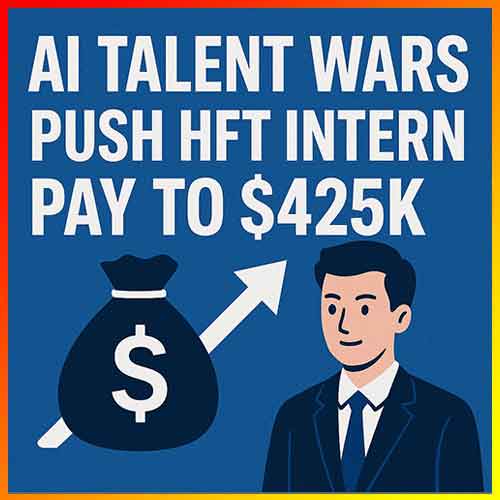
The global war for quantitative and engineering talent is heating up, and high-frequency trading (HFT) firms are dramatically increasing compensation to keep pace with the allure of Big Tech and AI research labs.
One leading HFT firm is offering returning interns packages of up to $425,000, signaling how aggressively proprietary trading firms are fighting to retain junior talent. Insiders reveal that of 55 interns, 29 received offers spanning quant trading, software engineering, and FPGA engineering. Quant interns were offered $250,000 base salaries with total packages of $425,000, while other roles saw smaller—yet still lucrative—packages depending on specialization.
This sharp escalation is not limited to one firm. IMC, with U.S. operations in Chicago, is reportedly paying quant interns total compensation of $71,000 for 10-week programs in 2026, including a $30,000 signing bonus. Jane Street has also raised intern pay for its upcoming cohorts, while financial engineering students at top programs are seeing monthly stipends as high as $25,000.
The strategy reflects a shift in hiring dynamics. In 2023, intern-to-employee conversions dropped sharply, with smaller hedge funds hiring rejected candidates. Performance downturns across quant firms created hesitation. But in 2025, despite a difficult trading environment, large HFT firms appear more protective of their talent pipeline, holding onto interns even in weaker years.
The underlying driver: AI companies like OpenAI and Anthropic are aggressively recruiting quants and engineers, offering packages of up to $3 million for experienced staff. Both firms have hosted networking events in New York and London to woo trading talent. Interns and early-career hires are increasingly comparing the intense, high-stakes environment of AI research with the structured, financially secure world of quant trading.
While HFT firms still offer unmatched compensation for juniors, they no longer dominate the talent conversation. The rise of AI has created a parallel market where mission-driven, research-intensive work competes with billion-dollar salaries. The result is an unprecedented wage war for the world’s brightest young minds in math, engineering, and computer science.
See What’s Next in Tech With the Fast Forward Newsletter
Tweets From @varindiamag
Nothing to see here - yet
When they Tweet, their Tweets will show up here.



























